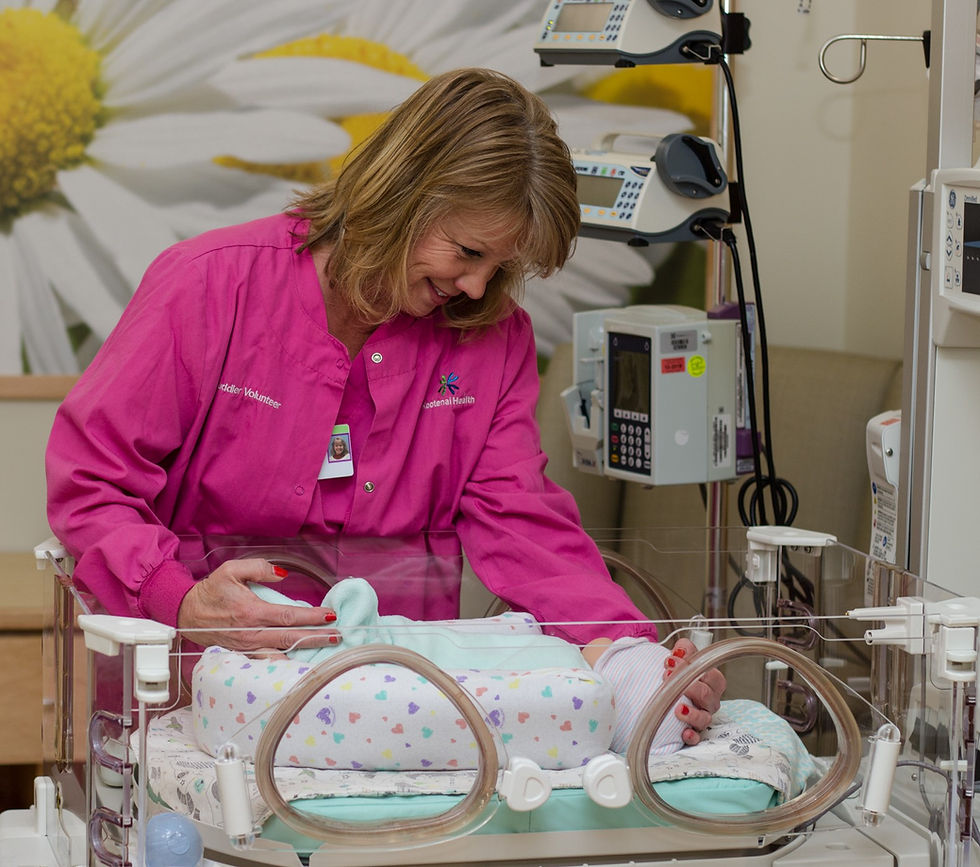Providing Comfort
- Volunteer Cuddling staff comforts babies. By
- Jan 31, 2019
- 4 min read

The Neonatal Intensive Care Unit (NICU) at Kootenai Medical Center can see anywhere from a couple to up to 16 babies a day, depending on what is happening in the maternity ward. Babies are brought to NICU for many reasons, most often when they are born premature, underweight or are in need of a medical procedure right after birth. Others are dealing with symptoms related to a mother’s drug or alcohol addiction. They are the most fragile infants in the hospital and are watched over by skilled nurses and also a group of highly motivated volunteers.
The Baby Cuddlers program was started just a few years ago with only a handful of volunteers working a few hours each week. It was determined that these most fragile infants needed the comforting touch and warmth of human contact when a parent would not be able to provide them with their full attention. Current Kootenai Health Cuddler Program Chairman Eileen Wilson remembered hearing about the program from her daughter, a nurse, and decided to apply.
“About 300 people responded, and I was one that was chosen,” she said. “That was about three years ago now.”
Wilson now coordinates with the 36 women and men who make up her team of cuddlers. Each is responsible for at least one four-hour shift per week, and the cuddling happens between the hours of 4am and midnight, seven days a week, all year long.
“We provide them with comfort. We are actually the only people to hold them other than their parents who are not wearing gloves,” explained Wilson.
NICU babies can spend just a day or two in the unit, but others might spend weeks or months. For parents who have other children at home, live a long way from the hospital or are recovering addicts, it creates a tough situation in which they are not able to spend all their time with their newborn. To this end the Baby Cuddlers step in to provide the touch and warmth of a caring adult and to sooth them during their time of need.
“Holding these babies promotes healing, it helps with weight gain, provides calming, encourages better sleep, better immune systems and overall better health,” said Wilson.
Putting a newborn baby into the hands of someone new is something not taken lightly. All applicants are screened via background check and the FBI fingerprint database. Those who are selected for the program go through a two-and-a-half-day orientation with hospital staff, which is followed by one-on-one training with Wilson, in which she goes over several protocol sheets and demonstrates proper handling. All applicants must be willing to get a flu shot, be non-smokers and cannot wear fragrance or have artificial fingernails, precautions all taken to provide the safest possible environment for the baby.
When a cuddler arrives for a shift they find out how many babies are currently in the NICU. They then coordinate with nurses who handle just a couple babies each to see where they are needed. The nurse provides the cuddler with feedback on when the baby last ate and slept, and whether they might need less stimulation or rocking than others. Cuddlers dress in the same sanitized scrubs as the nurses and wash their hands up to their elbows for a timed two minutes before entering the room and picking up the infant. They sit in a comfortable recliner in a semi-dark room and can hold the babies for up to two hours at a time, taking needed bathroom and water breaks when necessary.
Other times the cuddlers might assist to provide a comforting hand to an infant when blood is being drawn or other uncomfortable testing is being done on the baby. It takes a special kind of person to do this work.
“It’s very much a privilege to have this role and to manage these wonderful people who are willing to get up at 3am and be ready to work at 4am,” said Wilson.
There are over 150 volunteers at Kootenai Medical Center who provided 32,000 hours of work in 2018, 3,000 hours of which came from the Baby Cuddlers program. With the program currently filled, it’s not surprising to Wilson that so many people want to be a part of it.
“People are naturally drawn to babies and feel tremendous sympathy and concern when the mother is not there. For many of our volunteers, the experience brings them back to their own childbirth experience, and some of these people had premature babies as well,” she said.
While they don’t often get to see the infants once they are released from the NICU, the team of volunteers knows the care they are providing is having a direct impact on improving the baby’s health and growth. Wilson is so happy with the results that she hopes to share them with other hospitals around the county.
“I hope we can be an example of how this works and share our program with others because any hospital that has a NICU needs this program,” she said.
If you would like to apply for the Baby Cuddler program or see additional volunteer opportunities at Kootenai Health, contact Renae Langue at 208.625.465 or Rlangue@KH.org.







